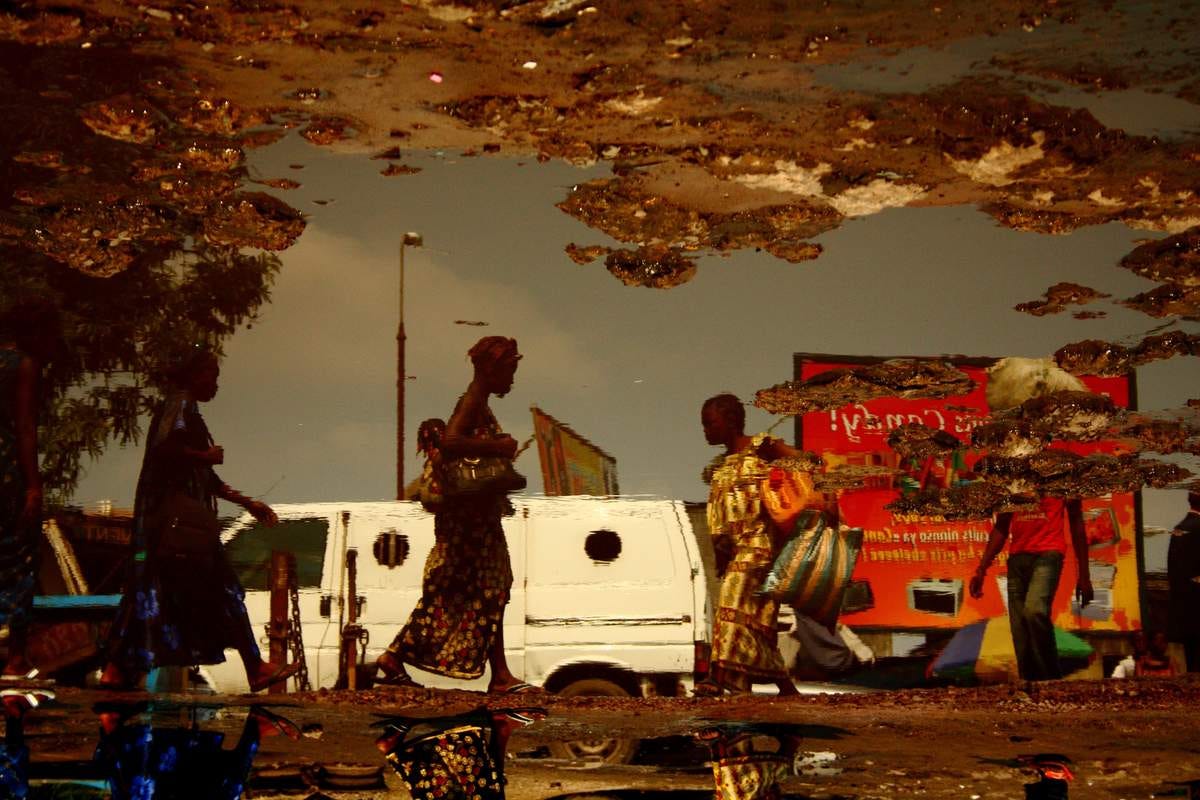🔅 African Photography Challenges Old Conventions, Is EU's Carbon Tax Too Hot for Africa?, And More
Plus, A Heat-Tolerant Coffee Strain is Back from the Dead & West's Ukraine Aid Draws African Looks.
Photo of the day: Gambia

Markets:
🟢 Nigerian SE: 61,523.57 (+1.33%)
🔴 Johannesburg SE: 75,909.49 (-0.41%)
🟢 Ghana SE: 2,821.82 (+0.13%)
🔴 Nairobi SE: 108.00 (-0.20%)
🔴 US S&P 500: 4,448.90 (-0.15%)
🔴 Shanghai Composite: 3,222.95 (-0.69%)
*Data accurate as of the close of markets across the continent
Brief & Bright: Africa's Top Five Highlights

📸 African Photography: A New Postcolonial Identity | Congolese photographer Kiripi Katembo had little access to professional photography equipment, so he found his own way of using the camera. His images look like sci-fi montages, but closer inspection reveals that these are actually reflections in puddles, turned upside down. It’s a testament to ingenuity, and a reminder that African photographers have been reclaiming the medium for centuries. In the 19th century, European explorers were returning the first photographic images of Africa, which inevitably reflected the mindset of the people creating them: “untamed” landscapes filtered through fantasies of “the dark continent.” Fast-forward to today, and African photographers have taken photography and run with it. At the turn of the 20th century, entrepreneurial white photographers set up studios for well-to-do locals. By the 1950s, the utopian, post-independence spirit of Pan-Africanism was sweeping the continent, and the medium was in the hands of Africans themselves. Contemporary photographers have built on this tradition, and the Tate Modern in the UK has them on full display in an exhibition called “A World in Common” that tracks how African photographers are using the medium to subvert conventions, find fresh modes of expression, and forge new, postcolonial identities for the continent. Check it out!
🌳 EU's Carbon Border Tax: Too Hot for Africa? | The EU is bringing in the world’s first carbon border tax in 2023, but it’s not exactly a welcome guest in the global south. Climate activists in the global north may be cheering the new policy, but in Africa, it’s being met with criticism and scepticism. The carbon border tax, which charges importers the same rate for carbon emissions as domestic producers, is expected to have a negative impact on African economies. A UN report says that it will wipe out 0.91% of the continent’s combined GDP—that’s three times the development cooperation budget that the EU committed to Africa this year. In other words, it’s gonna hurt. The question now is whether this kind of climate action is just. The sectors that will be affected—cement, iron & steel, aluminium, fertilisers, and electricity—are all key drivers of African economies. But it’s clear that this kind of policy is here to stay, so what’s needed from the EU side is a more tailored approach that gives African countries time to adjust, and the resources to do it.

🇳🇬 Tinubu's Tax Collection Initiative: Trading Cards to the Rescue | Nigeria is getting serious about taxes. The country’s federal revenue agency announced a partnership with the Market Traders Association of Nigeria (MATAN) to get the 40 million informal traders in the country to pay up. In an effort to increase Nigeria’s tax collection rate, which is one of the lowest in the world, MATAN members will get identity cards with tax identification numbers. Plus, a digital platform will track their turnover for tax purposes. The plan also hopes to shut down the touts and miscreants who have been doing their own illegal tax collecting in the country’s markets.
🌍 West's Ukraine Aid Draws African Looks | Africa is giving the West a side-eye as the latter showers Ukraine with financial aid. According to the OECD, the aid for Ukraine has shot up, while that for Africa fell by eight percent to $29 billion. As the IMF and World Bank met in Washington, African countries expressed fears of a double standard on international aid, a French government source said. The reason for the West’s largesse? Russia’s invasion of Ukraine. As of April, pledges for Ukraine totalled just over $150 billion, according to the German-based Kiel Institute for the World Economy (IfW). This week, the European Union proposed an additional $50 billion in assistance. With this level of aid, some African leaders are wondering why the West can’t summon the same level of commitment to helping their countries. Zambia’s foreign minister, Hassoumi Massoudou, said the money being pumped into Ukraine demonstrates that “resources and mechanisms exist” that could also be used to channel money to Africa. Another Zambian government official, who preferred not to be named, said the war in Ukraine underscored the need for Africa to become more self-sufficient and less reliant on western support.
🇸🇱 Brew News: A Heat-Tolerant Coffee is Back from the Dead | There’s a new coffee in town, and it’s not your ordinary brew. The Sierra Leone Highland Coffee, a heat-tolerant strain that had been lost to commercial production for more than 50 years because of neglect and civil war, has been successfully grown in a pilot project backed by trader Sucafina. That means you can still get your coffee fix even in the face of global warming. The variety yields a bean with a taste similar to Arabica, the benchmark for quality coffee, at temperatures 7C warmer. This is good news for coffee lovers everywhere, as this strain is seen as a potential answer to protecting the world’s coffee industry. So pour yourself a cup and drink to the success of the Sierra Leone Highland Coffee’s return from the dead!
Food for Thought
“Make some money but don’t let money make you.”
— Tanzanian Proverb.
Are we hitting the mark?
Enjoying Baobab's updates? Spread the joy and share us with friends and colleagues — we'd be thrilled to have them join!
Feedback or thoughts? Just hit reply. We're all ears!





